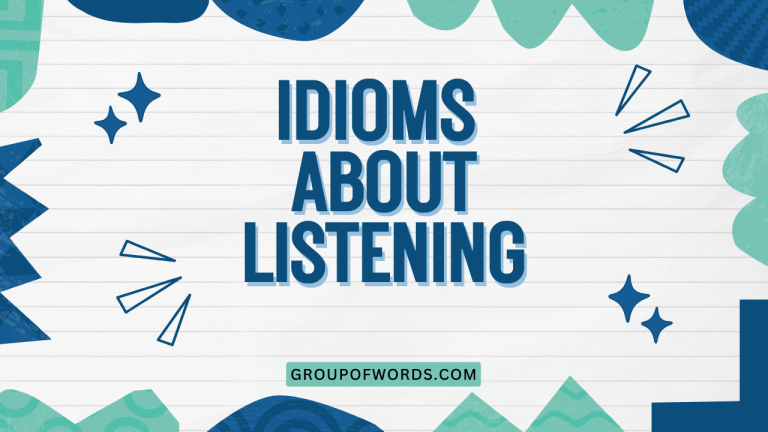Funny Bone Ticklers: Mastering Idioms for Humor in English
Idioms add color and depth to the English language, and understanding idioms related to humor is crucial for effective communication and comprehension. These expressions, often figurative, allow us to convey amusement, wit, and lightheartedness in a more nuanced and engaging way.
Mastering these idioms enhances not only your vocabulary but also your ability to appreciate and participate in humorous exchanges. This article is designed for English language learners of all levels, from beginners seeking to expand their vocabulary to advanced speakers aiming to refine their understanding of idiomatic expressions.
By exploring the definitions, structures, and usage of idioms for “funny,” you’ll gain a valuable tool for navigating the complexities of English conversation and writing.
Table of Contents
- Introduction
- What are Idioms for “Funny”?
- Structural Breakdown of Funny Idioms
- Types of Idioms Describing Humor
- Examples of Idioms for “Funny”
- Usage Rules for Idioms for “Funny”
- Common Mistakes with Idioms for “Funny”
- Practice Exercises
- Advanced Topics: Nuances and Regional Variations
- Frequently Asked Questions
- Conclusion
What are Idioms for “Funny”?
Idioms for “funny” are expressions whose meanings cannot be understood simply by looking at the individual words they comprise. These idioms often describe something that is humorous, someone who is humorous, or the act of laughing.
They add a layer of expressiveness to language, allowing speakers to convey subtle shades of meaning related to humor. These idioms are often deeply rooted in cultural contexts, making them particularly interesting to learn and understand.
In essence, idioms for “funny” are a type of figurative language. They work by creating a non-literal comparison or association that evokes a sense of amusement or laughter.
They can be classified based on the aspect of humor they relate to: the source of the humor (a funny joke), the person creating the humor (a comedian), or the reaction to the humor (laughter). Understanding their function and context is essential for using them correctly and effectively.
Structural Breakdown of Funny Idioms
The structure of idioms for “funny” can vary widely. Some idioms are simple phrases, while others are more complex clauses or sentences.
It’s important to remember that the individual words in an idiom don’t contribute to its overall meaning in a literal way. Instead, the entire phrase functions as a single unit of meaning.
Many idioms follow common grammatical patterns, such as subject-verb-object or prepositional phrases. However, the key is that these patterns are used in a non-literal or figurative way.
For instance, the idiom “crack someone up” follows a subject-verb-object structure, but its meaning (“to make someone laugh a lot”) is not directly related to the literal meanings of “crack,” “someone,” and “up.”
Recognizing the underlying structure of an idiom can help you remember its meaning and use it correctly. However, it’s equally important to understand that idioms are often fixed expressions, meaning that you cannot change the words or their order without altering or destroying the idiom’s meaning.
The best approach is to learn idioms as complete units, paying attention to their context and usage.
Types of Idioms Describing Humor
Idioms related to humor can be categorized based on what aspect of humor they describe. Here are some major categories:
Idioms Describing Something Funny
These idioms are used to describe jokes, situations, or events that are humorous. They often convey a sense of amusement, wit, or absurdity.
Idioms Describing a Funny Person
These idioms are used to describe someone who is humorous, witty, or good at making others laugh. They often highlight the person’s comedic talent or personality.
Idioms Describing Laughter
These idioms describe the act of laughing itself, often emphasizing the intensity or quality of the laughter. They can convey a range of emotions, from amusement to hysteria.
Idioms Describing a Failed Attempt at Humor
These idioms describe jokes, situations, or events that are not humorous, and fail to make people laugh. They often convey a sense of awkwardness, embarrassment or seriousness.
Examples of Idioms for “Funny”
The following sections provide examples of idioms related to humor, categorized by the aspect of humor they describe. Each example is accompanied by a definition and a sample sentence to illustrate its usage.
Examples Describing Something Funny
This table provides examples of idioms used to describe things that are funny. Each row includes the idiom, its definition, and an example sentence.
| Idiom | Definition | Example Sentence |
|---|---|---|
| A laugh a minute | Extremely funny and entertaining | The movie was a laugh a minute; I couldn’t stop chuckling. |
| A barrel of laughs | A lot of fun or amusement | The party was a barrel of laughs; everyone had a great time. |
| Crack someone up | To make someone laugh a lot | His silly jokes always crack me up. |
| Have someone in stitches | To make someone laugh uncontrollably | The comedian had the audience in stitches with his stand-up routine. |
| Roll in the aisles | To laugh uncontrollably | The slapstick comedy had us rolling in the aisles. |
| Side-splitting | Extremely funny | The movie was side-splitting; I had tears in my eyes from laughing. |
| A scream | Very funny | That joke was a scream! |
| Killing me | Very funny (often used hyperbolically) | That meme is killing me! |
| Funny as a crutch | Very funny | The comedian was funny as a crutch, everyone was laughing. |
| Fun and games | Enjoyable activities, often lighthearted | The office party was all fun and games until someone spilled punch on the boss. |
| Lighten the mood | To make a situation less serious or tense | He told a joke to lighten the mood after the argument. |
| A hoot | Something or someone very funny | That clown was a real hoot at the circus. |
| Knee-slapper | A very funny joke or story | He told a knee-slapper that had everyone laughing. |
| A riot | Something or someone very funny | The improv show was a riot from start to finish. |
| Bring the house down | To cause a strong reaction of laughter or applause | Her performance brought the house down. |
| Tickle someone’s funny bone | To amuse someone | That cartoon really tickled my funny bone. |
| Laugh your head off | To laugh a lot and heartily | We laughed our heads off at the comedian’s jokes. |
| A bundle of laughs | A very funny person or thing | The new sitcom is a bundle of laughs. |
| Witty banter | Clever and amusing conversation | The movie was full of witty banter between the two main characters. |
| A comical sight | Something that looks funny | The dog wearing sunglasses was a comical sight. |
| Laughing stock | A person or thing that is ridiculed | He became the laughing stock of the office after his embarrassing mistake. |
| Comedy of errors | A situation full of mistakes and mishaps that are amusing | The whole trip was a comedy of errors, but we still had fun. |
| A funny farm | A mental institution (humorous, often insensitive) | He joked that he was going to end up in a funny farm after all the stress. |
| That’s a good one! | An expression used to show that you found a joke funny | “Why don’t scientists trust atoms? Because they make up everything!” – “Haha, that’s a good one!” |
| I nearly died laughing | An exaggeration of how funny something was | “When he tripped over the rug, I nearly died laughing!” |
Examples Describing a Funny Person
This table provides examples of idioms used to describe people who are funny. Each row includes the idiom, its definition, and an example sentence.
| Idiom | Definition | Example Sentence |
|---|---|---|
| A card | A funny or amusing person | He’s such a card; he always makes us laugh. |
| A comedian | A person who entertains by telling jokes | The comedian had the whole audience laughing. |
| A real character | An eccentric or amusing person | My grandmother is a real character; she always has a funny story to tell. |
| Life of the party | Someone who is lively and entertaining at social events | He’s always the life of the party, making everyone laugh. |
| A wit | A person with a clever and humorous intellect | Oscar Wilde was known as a great wit. |
| A joker | Someone who is always telling jokes | He’s such a joker; he can’t be serious for more than five minutes. |
| A clown | Someone who acts silly to make people laugh | He was such a clown, always making silly faces. |
| A funny guy | A person who is humorous | He’s a really funny guy; I always enjoy his company. |
| A stand-up comedian | A comedian who performs live in front of an audience | The stand-up comedian had the audience in stitches. |
| A prankster | Someone who plays practical jokes | My brother is a notorious prankster. |
| A wise guy | Someone who makes sarcastic or witty remarks | He’s a bit of a wise guy, always cracking jokes. |
| A goofball | A silly or foolish person | He’s such a goofball, but he’s always fun to be around. |
| A cut-up | A person who is always joking or clowning around | She’s a real cut-up; she keeps us all entertained. |
| A card | A person who is amusing or eccentric | Old Mr. Henderson is quite a card, always telling tall tales. |
| A scream | A very funny person | She is a scream, always making me laugh until my stomach hurts. |
| A riot | A very funny person | That guy is a riot; he should be a comedian. |
| A waggish person | Someone who is humorous in a playful, mischievous, or facetious manner | The waggish professor kept the class engaged with his clever jokes. |
| A jester | A professional joker or clown, traditionally employed by a king or nobleman | The king kept a jester at court to provide amusement. |
| A funster | A person who is full of fun and enjoys making others laugh | He’s a true funster, always the first to suggest a game or activity. |
| A merry-andrew | A clown or buffoon | The merry-andrew entertained the crowd with his slapstick antics. |
| A caution | A person who is remarkably eccentric or amusing | That old lady is a caution; she does the craziest things! |
| A caution to snakes | A very funny or eccentric person | He’s a real caution to snakes with his crazy stories. |
| A rogue | A playfully mischievous person | That little boy is a rogue, always playing pranks. |
| A caution | An amusingly eccentric person | She’s a real caution; you never know what she’ll do next! |
| Has a good sense of humor | Able to find things amusing and laugh at them | He has a good sense of humor and always sees the funny side of things. |
Examples Describing Laughter
This table provides idioms that describe the act or sound of laughter. Each row includes the idiom, its definition, and an example sentence.
| Idiom | Definition | Example Sentence |
|---|---|---|
| Burst out laughing | To suddenly start laughing | She burst out laughing when he tripped. |
| Crack up | To laugh uncontrollably | The joke was so funny, we all cracked up. |
| Giggle | To laugh in a silly or nervous way | The girls giggled when the boy walked by. |
| Howl with laughter | To laugh very loudly | The audience howled with laughter at the comedian’s jokes. |
| Roar with laughter | To laugh very loudly and heartily | The entire audience roared with laughter at the punchline. |
| Snicker | To laugh quietly in a disrespectful way | The students snickered when the teacher made a mistake. |
| Tee-hee | A high-pitched giggle | She gave a little tee-hee when he told the joke. |
| Chuckle | To laugh quietly | He chuckled to himself as he remembered the funny incident. |
| Die laughing | To laugh excessively | We almost died laughing at the comedy show. |
| In stitches | Laughing uncontrollably | The comedian had the audience in stitches. |
| Laugh your socks off | To laugh very hard | We laughed our socks off watching the movie. |
| Rolling in the aisles | Laughing uncontrollably | The slapstick comedy had us rolling in the aisles. |
| Guffaw | A loud, hearty laugh | He let out a hearty guffaw at the joke. |
| A belly laugh | A deep, hearty laugh | The comedian elicited a belly laugh from the audience. |
| A horse laugh | A loud, coarse laugh | He gave a horse laugh at the misfortune of others. |
| A silent laugh | Laughing without making a sound | She gave a silent laugh, trying not to disturb anyone. |
| A nervous laugh | Laughing nervously, often in an uncomfortable situation | He gave a nervous laugh when he realized his mistake. |
| A wry laugh | A dry, ironic laugh | She gave a wry laugh at the absurdity of the situation. |
| A knowing laugh | A laugh indicating shared understanding or secret | They exchanged knowing laughs across the room. |
| An empty laugh | A laugh that sounds hollow or insincere | His empty laugh revealed his discomfort. |
Examples Describing a Failed Attempt at Humor
This table provides idioms that describe situations where humor falls flat or is inappropriate. Each row includes the idiom, its definition, and an example sentence.
| Idiom | Definition | Example Sentence |
|---|---|---|
| Fall flat | To fail to produce the intended effect, especially humor | His joke fell flat; no one laughed. |
| Bomb | To fail completely, especially a performance | The comedian bombed on opening night. |
| Die on stage | To perform very badly in front of an audience | The actor felt like he was dying on stage when he forgot his lines. |
| Go down like a lead balloon | To be received very badly | His suggestion went down like a lead balloon at the meeting. |
| Miss the mark | To fail to achieve the intended result | His attempt at humor missed the mark and offended several people. |
| Not be a laughing matter | To be a serious issue, not something to joke about | The company’s financial situation is not a laughing matter. |
| Too soon | Referring to a joke or comment that is inappropriate because it relates to a recent tragedy or sensitive event | Making jokes about the accident is too soon. |
| Read the room | To be aware of the mood and attitudes of the people present | He didn’t read the room and told an inappropriate joke. |
| Put your foot in it | To say something tactless or embarrassing | He really put his foot in it when he asked her about her divorce. |
| Awkward silence | A silence filled with discomfort | An awkward silence followed his failed joke. |
| Touchy subject | A topic that is easily upsetting or offensive | Politics is a touchy subject at family gatherings. |
| A hard sell | Something difficult to convince people of, or to make them accept | Trying to make people laugh at that joke was a hard sell. |
| Go over someone’s head | To be too difficult for someone to understand | The joke went over his head, and he didn’t get it. |
| Come off wrong | To be misunderstood or misinterpreted | His attempt at being funny came off wrong and offended her. |
Usage Rules for Idioms for “Funny”
Using idioms correctly requires understanding their specific meanings, contexts, and grammatical structures. Here are some general rules to follow:
- Learn the meaning: Always be sure you understand the precise meaning of an idiom before using it. Dictionaries and online resources can be helpful.
- Consider the context: Idioms are often informal and may not be appropriate in formal settings. Consider your audience and the situation before using an idiom.
- Use the correct form: Idioms are often fixed expressions, so it’s important to use the words and their order correctly.
- Don’t overdo it: Using too many idioms can make your language sound unnatural or forced. Use them sparingly and appropriately.
- Pay attention to regional variations: Some idioms are more common in certain regions or dialects than others. Be aware of these variations to avoid confusion.
It’s also important to note that some idioms can have multiple meanings or connotations. For example, the idiom “a scream” can mean something is very funny, but it can also mean someone is behaving in an outrageous or unacceptable way.
Pay attention to the context to determine the intended meaning.
Common Mistakes with Idioms for “Funny”
One of the most common mistakes is taking idioms literally. Because idioms are figurative expressions, their meanings cannot be derived from the individual words they contain.
For instance, someone might misunderstand “crack someone up” to mean physically breaking someone, rather than making them laugh.
Another common mistake is using the wrong words or word order in an idiom. Because idioms are fixed expressions, changing the words or their order can alter or destroy the idiom’s meaning.
For example, saying “break someone up” instead of “crack someone up” is incorrect.
Finally, it’s important to use idioms appropriately in terms of context and formality. Using informal idioms in formal settings can be inappropriate, and using idioms that are unfamiliar to your audience can lead to confusion.
Here are some examples of common mistakes:
| Incorrect | Correct | Explanation |
|---|---|---|
| “The movie was a laugh every minute.” | “The movie was a laugh a minute.” | Incorrect word order: “laugh a minute” is the correct idiom. |
| “He made me crack down.” | “He cracked me up.” | Incorrect idiom: “crack me up” means to make someone laugh. |
| “This is a laughing thing.” | “This is not a laughing matter.” | Complete misunderstanding of the idiom. |
| “She laughed her head from.” | “She laughed her head off.” | Incorrect preposition: “off” is the correct preposition for this idiom. |
Practice Exercises
Test your understanding of idioms for “funny” with these exercises. Fill in the blanks with the appropriate idiom from the list provided.
Idiom List: crack someone up, a barrel of laughs, fall flat, have someone in stitches, lighten the mood, a funny guy
| Question | Answer |
|---|---|
| 1. He’s such ____; he always makes us laugh. | a funny guy |
| 2. His jokes always ____. | crack someone up |
| 3. The party was ____; we had a great time. | a barrel of laughs |
| 4. The comedian had the audience ____ with his hilarious routine. | have someone in stitches |
| 5. His joke ____; no one laughed. | fall flat |
| 6. To ____, he told a joke after the tense meeting. | lighten the mood |
| 7. That movie was ____. I couldn’t stop laughing the whole time! | a barrel of laughs |
| 8. Stop trying to ____ with those ridiculous jokes. They are not working. | crack someone up |
| 9. He is such ____. Always ready with a joke. | a funny guy |
| 10. I hope this joke will ____. Things have been too serious lately. | lighten the mood |
Exercise 2: Match the idiom with its definition.
| Idiom | Definition | Answer |
|---|---|---|
| 1. A scream | a. To laugh very loudly | 1. b |
| 2. Howl with laughter | b. Very funny | 2. a |
| 3. Put your foot in it | c. To say something tactless or embarrassing | 3. c |
| 4. Life of the party | d. Someone who is lively and entertaining at social events | 4. d |
| 5. Go down like a lead balloon | e. To be received very badly | 5. e |
| 6. Tickle someone’s funny bone | f. To amuse someone | 6. f |
| 7. Knee-slapper | g. A very funny joke or story | 7. g |
| 8. A riot | h. Something or someone very funny | 8. h |
| 9. Comedy of errors | i. A situation full of mistakes and mishaps that are amusing | 9. i |
| 10. Killing me | j. Very funny (often used hyperbolically) | 10. j |
Exercise 3: Choose the correct idiom to complete the sentence.
| Question | Options | Answer |
|---|---|---|
| 1. The comedian _________ with his hilarious jokes. | a) fell flat b) had us in stitches c) missed the mark | b) had us in stitches |
| 2. His attempt at humor _________ and offended everyone. | a) went down like a lead balloon b) brought the house down c) tickled my funny bone | a) went down like a lead balloon |
| 3. She is the _________, always making everyone laugh at parties. | a) life of the party b) joker c) card | a) life of the party |
| 4. The joke was a real _________; I couldn’t stop laughing. | a) scream b) hard sell c) awkward silence | a) scream |
| 5. He _________ when he made a joke about her weight. | a) cracked me up b) brought the house down c) put his foot in it | c) put his foot in it |
| 6. The professor is a _________; he keeps the class engaged with his clever jokes. | a) waggish person b) merry-andrew c) caution | a) waggish person |
| 7. The movie was _________, I nearly died laughing. | a) a hoot b) a caution c) killing me | c) killing me |
| 8. He told a _________ that had everyone laughing. | a) comical sight b) knee-slapper c) empty laugh | b) knee-slapper |
| 9. The clown was a real _________ at the circus. | a) wise guy b) goofball c) hoot | c) hoot |
| 10. The whole trip was a _________, but we still had fun. | a) comedy of errors b) empty laugh c) hard sell | a) comedy of errors |
Advanced Topics: Nuances and Regional Variations
For advanced learners, understanding the nuances and regional variations of idioms for “funny” is crucial. Some idioms may have subtle differences in meaning or connotation depending on the context or the speaker’s background.
For example, the idiom “a caution” can be used to describe someone who is amusingly eccentric, but it can also be used to describe someone who is dangerous or unpredictable.
Regional variations in idioms can also be significant. Some idioms may be more common in certain regions or dialects than others.
For example, the idiom “funny as a crutch” is more common in some parts of the United States than in others. Additionally, some idioms may have different meanings in different regions.
For instance, the term “taking the mickey” in British English means to tease or make fun of someone, while in other English-speaking countries, it may not be understood or may have a different meaning.
To master these nuances and regional variations, it’s important to expose yourself to a wide range of English speakers and materials. Watching movies and TV shows, reading books and articles, and engaging in conversations with native speakers can all help you develop a deeper understanding of idioms for “funny.” Paying attention to the context in which idioms are used and asking questions when you’re unsure of their meaning can also be helpful.
Frequently Asked Questions
- What is the difference between an idiom and a proverb?
An idiom is a phrase whose meaning is not predictable from the usual meanings of its constituent elements (e.g., “kick the bucket” means “to die”). A proverb is a short, well-known saying that expresses a general truth or piece of advice (e.g., “look before you leap”).
- How can I learn new idioms effectively?
Learn idioms in context by reading books, watching movies, and listening to native speakers. Keep a notebook of new idioms you encounter, along with their meanings and example sentences. Practice using the idioms in your own speaking and writing.
- Are idioms the same in all English-speaking countries?
No, idioms can vary significantly between different English-speaking countries and regions. Some idioms may be common in one region but unfamiliar or have different meanings in another.
- Is it okay to use idioms in formal writing?
Generally, idioms are more appropriate for informal writing and conversation. In formal writing, it’s usually best to use more direct and literal language.
- What should I do if I don’t understand an idiom?
Ask the speaker to explain the idiom, or look it up in a dictionary or online resource. Pay attention to the context in which the idiom is used to help you understand its meaning.
- How can I avoid misusing idioms?
Learn the precise meaning and usage of each idiom before using it. Pay attention to the context in which the idiom is used, and avoid using idioms in situations where they might be misunderstood or inappropriate.
- Why is it important to learn idioms?
Learning idioms helps you understand native speakers better, makes
your language more colorful and expressive, and allows you to participate more fully in English conversations and culture.
Conclusion
Mastering idioms for “funny” is an enriching journey that enhances your understanding and appreciation of the English language. By familiarizing yourself with these expressions, you not only improve your communication skills but also gain insights into the cultural nuances that shape humor.
Whether you’re describing a side-splitting joke, an amusing person, or a hearty laugh, idioms provide a colorful and expressive way to convey your thoughts and emotions.
Continue to explore and practice these idioms in various contexts to reinforce your learning. The more you engage with the language, the more natural and confident you’ll become in using these expressions.
Embrace the humor and wit that idioms bring, and enjoy the journey of becoming a more fluent and culturally aware English speaker.






